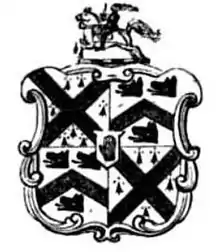Judkin-Fitzgerald baronets
The Baronetcy of Lisheen, County Tipperary, was created in the Baronetage of the United Kingdom on 5 August 1801 for Col. Thomas Judkin-Fitzgerald (Uniacke), who had adopted the surname of Judkin in compliance with the will of his maternal uncle Judge John Lapp Judkin, of Cashel. The title was a reward for suppressing the United Irish Rebellion of 1798 in Co Tipperary as High Sheriff of Tipperary.[1]
On his death in 1810, in a "criminatory obituary" and in reference to his excessive use of the cat o' nine tails at this time, it was said that "The history of his life and loyalty is written in legible characters on the backs of his fellow countrymen."[2]
He was succeeded by his son John, the second Baronet.[3][4] John was Mayor of Cashel, and High Sheriff of Tipperary in 1819; the third Baronet Thomas was also a magistrate, and a Deputy Lieutenant for the County Tipperary.[5][6] With the death of the fourth Baronet in 1917, the baronetcy became apparently extinct or dormant.
Judkin-Fitzgerald baronets, of Lisheen (1801)
- Sir Thomas Judkin-Fitzgerald, 1st Baronet (1754–1810), High Sheriff of Tipperary 1798[7][8]
- Sir John Judkin-Fitzgerald, 2nd Baronet (1787–1860) High Sheriff of Tipperary 1819, Mayor of Cashel, died aboard the PS Nimrod.[8]
- Sir Thomas Judkin-Fitzgerald, 3rd Baronet (1820–1864), magistrate and Deputy Lieutenant for the County Tipperary.[8] His residence "Golden Hills" was named after the townland in which it was located Golden Hills, near the village of Golden, in the barony of Clanwilliam.[9] Dr. Matthew S. Kennedy. Death from temporary insanity. Reported by Thomas Mack. Source: A return of inquisitions held by the coroner for the South Riding of the County of Tipperary commencing 1st Feb 1864 and ending June 1864.[10]
- Sir Joseph Capel Judkin-Fitzgerald, 4th Baronet (1853–1917)
Heraldic insignia
 Sir John Judkin-Fitzgerald, 2nd Bt |
Coat of arms
|
Ancestry
| Ancestors of Judkin-Fitzgerald baronets | |||||||||||||||||||||||||||||||||||||||||||||||||||||||||||||||||||||||||||||||||||||||||||||||||||||||||||||||||||||||||||||||||||||||||||||||||||||||||||||||||||||||||||||||||||||||||||||||||||||||||||||||||||||||||||||||||||||||||||||||||||||||||||||||||||||||||||||||||||||||||||||||||||||||||||||||||||||||||||||||||||||||||||||||||||||||||||||||||||||||||||||||||||||||||||||||||||||||||||||||||||||||||||||||||||||||||||||||||||||||||||||||||||||||||||||||||||
|---|---|---|---|---|---|---|---|---|---|---|---|---|---|---|---|---|---|---|---|---|---|---|---|---|---|---|---|---|---|---|---|---|---|---|---|---|---|---|---|---|---|---|---|---|---|---|---|---|---|---|---|---|---|---|---|---|---|---|---|---|---|---|---|---|---|---|---|---|---|---|---|---|---|---|---|---|---|---|---|---|---|---|---|---|---|---|---|---|---|---|---|---|---|---|---|---|---|---|---|---|---|---|---|---|---|---|---|---|---|---|---|---|---|---|---|---|---|---|---|---|---|---|---|---|---|---|---|---|---|---|---|---|---|---|---|---|---|---|---|---|---|---|---|---|---|---|---|---|---|---|---|---|---|---|---|---|---|---|---|---|---|---|---|---|---|---|---|---|---|---|---|---|---|---|---|---|---|---|---|---|---|---|---|---|---|---|---|---|---|---|---|---|---|---|---|---|---|---|---|---|---|---|---|---|---|---|---|---|---|---|---|---|---|---|---|---|---|---|---|---|---|---|---|---|---|---|---|---|---|---|---|---|---|---|---|---|---|---|---|---|---|---|---|---|---|---|---|---|---|---|---|---|---|---|---|---|---|---|---|---|---|---|---|---|---|---|---|---|---|---|---|---|---|---|---|---|---|---|---|---|---|---|---|---|---|---|---|---|---|---|---|---|---|---|---|---|---|---|---|---|---|---|---|---|---|---|---|---|---|---|---|---|---|---|---|---|---|---|---|---|---|---|---|---|---|---|---|---|---|---|---|---|---|---|---|---|---|---|---|---|---|---|---|---|---|---|---|---|---|---|---|---|---|---|---|---|---|---|---|---|---|---|---|---|---|---|---|---|---|---|---|---|---|---|---|---|---|---|---|---|---|---|---|---|---|---|---|---|---|---|---|---|---|---|---|---|---|---|---|---|---|---|---|---|---|---|---|---|---|---|---|---|---|---|---|---|---|---|---|---|---|---|---|---|---|---|---|---|---|---|---|---|---|---|---|---|---|---|---|---|---|---|---|---|---|---|---|---|---|---|---|---|---|---|---|---|---|---|---|---|---|---|---|---|---|---|---|
| |||||||||||||||||||||||||||||||||||||||||||||||||||||||||||||||||||||||||||||||||||||||||||||||||||||||||||||||||||||||||||||||||||||||||||||||||||||||||||||||||||||||||||||||||||||||||||||||||||||||||||||||||||||||||||||||||||||||||||||||||||||||||||||||||||||||||||||||||||||||||||||||||||||||||||||||||||||||||||||||||||||||||||||||||||||||||||||||||||||||||||||||||||||||||||||||||||||||||||||||||||||||||||||||||||||||||||||||||||||||||||||||||||||||||||||||||||
References
- Lee, Sidney, ed. (1892). . Dictionary of National Biography. Vol. 30. London: Smith, Elder & Co.
- Fitzpatrick, William John (1866). "The sham squire;" and the informers of 1798: with a view of their contemporaries ; to which are added, in the form of an appendix, jottings about Ireland seventy years ago (3 ed.). W.B. Kelly. p. 219. Retrieved 29 November 2011.
- The baronetage of England By John Debrett (1839) p294
- The baronetage of England. revised, corrected and continued by G. W. Collen By John Debrett (1840) p203
- The Peerage and Baronetage By Edmund Lodge (1861)
- THE FITZGERALD SUICIDE—EXTRAORDINARY SCENE AT THE BURIAL.
- Power, Thomas P. "Fitzgerald, Sir Thomas Judkin-, first baronet (1754–1810)". Oxford Dictionary of National Biography (online ed.). Oxford University Press. doi:10.1093/ref:odnb/15157. (Subscription or UK public library membership required.)
- Foster, Joseph (1881). The Baronetage and Knightage. Nichols and Sons. p. 225.
- "Site Fact Sheet: Golden Hills". National Inventory of Architectural Heritage. Department of Arts, Heritage and the Gaeltacht. Retrieved 4 December 2013.
- "The Irish Times"; Page 3; published Monday, 2 May 1864 "DEATH OF SIR THOMAS J FITZGERALD, BART"
- The General Armory of England, Scotland, Ireland, and Wales: Comprising a Registry of Armorial Bearings from the Earliest to the Present Time p.354 By Bernard Burke Published by Harrison & sons, 1864 Original from the University of Michigan Digitized 4 June 2008 1185 pages
Further reading
- An Historical Review of the State of Ireland from the Invasion of that ... By Francis Plowden (1806) Printed and published by W. F. McLaughlin and Bartholomew Graves, Ireland v.5
- A Complete Collection of State Trials and Proceedings for High Treason and Other Crimes and Misdemeanors Compiled by Thomas Bayly Howell (1820) Longman, Hurst, Rees, Orme and Brown v. 27 (1798–1800)
- The History of Ireland: From Its Invasion Under Henry II. to Its Union with ... By Francis Plowden (1812) v.2 p452 incl Judkin-Fitzgerald's visits to Dublin Castle and subsequent capitulation by Francis Arthur Esq on board Minerva Captd & witnessed by Joseph Salkeld, Mate Henry Harrison which also transported United Irish Wicklow General Joseph Holt (rebel) Holt Fellowship